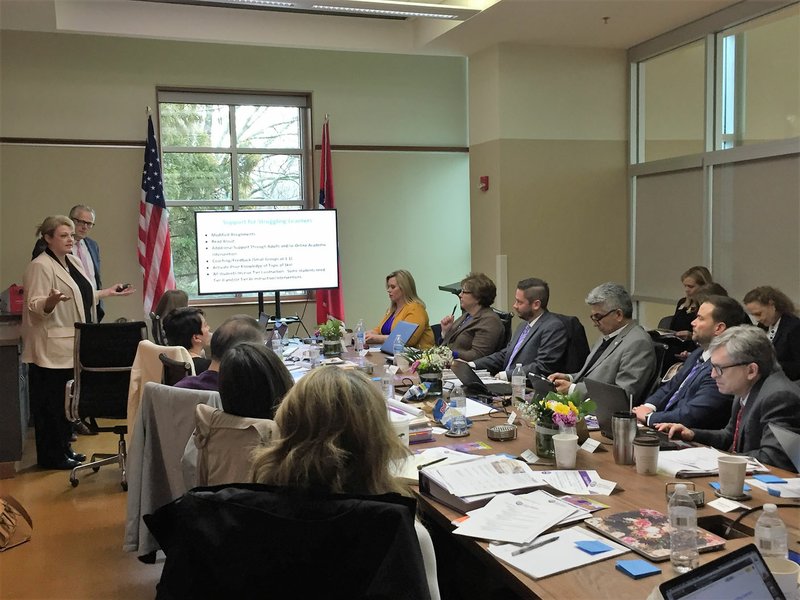FAYETTEVILLE -- The School Board met Friday and Saturday to continue working on a plan they hope will guide the schools for the next five years.
Board members spent a total of about 12 hours over the two days at the public library, where they heard administrators present information related to what's happening in the School District's various departments.
Goals
The Fayetteville School District’s strategic plan for 2019 to 2023 consists of the following four goals:
Goal 1: All students, regardless of demographic background, will experience equitable support in taking up and meeting academic challenges.
Goal 2: All students will learn to set effective academic and career goals and high personal standards for themselves.
Goal 3: All students will learn in a culture of integrity, honesty, trust and teamwork.
Goal 4: All students will have equitable, financially sustainable access to safe and innovative physical and technological resources.
Source: Fayetteville School District
The board is developing a five-year strategic plan consisting of four broad goals. Each goal will come with a set of three to five objectives. Much of the board's work now involves refining the objectives and deciding what metrics to use in gauging progress toward them.
Justin Eichmann, board president, said board members have invested hundreds of hours in the project and still have more to do. They intend to complete the plan by this summer.
Eichmann is proud of the work board members and administrators have put into it, in part because it has forced them to acknowledge both strengths and weaknesses within the district.
"So you kind of open yourself up there," Eichmann said. "The superintendent was willing to do it and his staff was willing to do it. And I think it makes us a better district."
The plan has its roots in Framing Our Future, a community outreach and input initiative that began in 2015 and involved more than 300 community and staff members. Framing Our Future resulted in a 127-page report laying out a plan for student success that was submitted to the board in September 2016.
Goals included in the strategic plan are focused on teaching and learning, student and faculty support, and facilities and systems.
Greg Mones, human resources director, spoke about one of the proposed objectives of diversifying the teaching staff to better reflect the student body. Minorities make up 5.4 percent of the staff, whereas about 32 percent of the district's students are minorities. Mones would like to bump the percentage of minority teachers up to at least 6.6 percent this year.
The district intends to be more aggressive in hiring minorities. When administrators meet potential employees who are minorities at job fairs later this month, they'll arrange to have them interview with two principals in early March -- thus accelerating the process of identifying good job candidates, Mones said.
Officials discussed reducing by 1 percent each year the achievement gap between rich and poor students and between white and nonwhite students in each content area and each grade level -- part of a goal of having all students experience equitable support in their academic pursuits.
Robert Maranto, a board member, said he'd like to see most of those gains made in a student's early years.
"The big emphasis on closing achievement gaps has to be in elementary school, when a kid has one teacher instead of six," Maranto said.
Some of Saturday's discussion involved facilities, finances and technology. Megan Slocum, associate superintendent for support services, talked about the "power of tiny gains" -- basically, looking at improvement as a slow but steady march that adds up in a big way over time.
"Every day we go to work, the goal for us is, how do we make sure we're 1 percent better than we were the day before," Slocum said. "It does sound tiny, it does sound low, and you think 'yeah, I think I could achieve 1 percent.' If we do 1 percent better, it really does make a difference."
Board members spent additional time Saturday talking about proposed metrics from the staff and any changes they'd like to make to those metrics.
"We have some further refinements to do," Eichmann said. "It's fine-tuning more than anything else."
NW News on 02/18/2019

